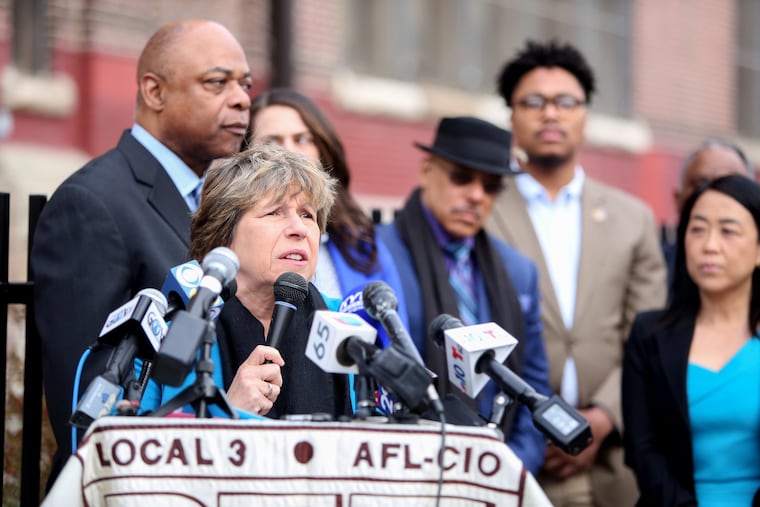Price tag for fixing all urgent Philly school building problems? $170M, union, lawmakers say
The money would go to remove lead paint and asbestos problems underscored by The Inquirer’s reporting; replace leaky windows and roofs; install new heating systems; upgrade electrical service, and pay for more cleaners to ameliorate the rodent and bug problems that plague many city schools.

A group of state and local lawmakers and union leaders has done the math: It would cost $170 million, they said Friday, to remedy all the urgent health and safety problems inside the Philadelphia School District.
The money would go to not just remove lead paint and asbestos problems underscored by The Inquirer’s reporting, but to replace leaky windows and roofs, install new heating systems, upgrade electrical service, and pay for more cleaners to ameliorate the rodent and bug problems that plague many city schools.
Lawmakers, Philadelphia Federation of Teachers president Jerry Jordan, and Randi Weingarten, the president of the American Federation of Teachers, said that the money would have to come from state, local, and federal funds, but that they had no specific plan to get it. .
“For too long, students across our city and our state have suffered from a catastrophic disinvestment in school facilities,” said State Rep. Elizabeth Fiedler (D., Phila.), standing outside Francis Scott Key Elementary, the district’s oldest school. It was built in 1889, and, like many schools across the city, has a host of problems.
Officials said the $170 million is comprised of mostly onetime costs, but did include recurring expenses, like hiring more cleaners to keep schools in better shape, which would address the infestation issues.
The group, which has dubbed itself the “Fund our Facilities Coalition," said each of the Philadelphia School District’s funders would be responsible for part of the cash, but suggested that the state would have to pick up a large share of the tab.
“When we get to Harrisburg, one of the key issues is going to be education funding; it always is,” said State Sen. Larry Farnese (D., Phila.), alluding to ongoing budget negotiations. “This year, we’re underscoring the facilities piece.”
Gov. Wolf last week proposed a severance tax on natural gas extraction to fund a $4.5 billion plan that would pay for the removal of lead paint from schools in Philadelphia and the rest of the state, but that faces an uphill battle in the Republican-controlled legislature. Wolf last year earmarked $7.6 million in new state cash to fix lead paint at some schools, but that only tackled “a handful” of classrooms, State Sen. Vincent Hughes (D., Phila.) said.
City Councilwoman Helen Gym noted that the group was asking for “real money,” she said, and while there is no clear path now, “I know that we don’t get anywhere unless we make a whole lot of noise.”
Weingarten, the national teachers’ union president, said forming a group to push was a start.
“What you see here is an unprecedented coalition to say, ‘We must make sure we do not poison our children,’” said Weingarten.
What kind of response the plea might receive in Harrisburg is unclear. A spokesman for House Republicans on Friday did not respond to a request for comment.
Correction: A previous version of this story misidentified the office held by State. Rep. Elizabeth Fiedler.